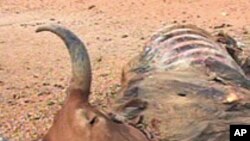Rains brought on by the El Nino weather pattern are falling over parts of East Africa. But while they are a welcome sight after a long, harsh drought, they probably won't be enough to ease long-term emergency food needs.
"The rains have started throughout the Horn of Africa, except for a few patches such as northeastern Somalia, says the World Food Program's Peter Smerdon in Nairobi. "But certainly southern Somalia has had a strong start to the short rains."
The rains are also off to a good start in northeastern Kenya and many parts of Ethiopia.
"So things are looking good for the time being. It looks like the forecasts of a near to normal or normal short rains may be correct. But…we need the rains to continue coming in through December," he says.
But will rains affect emergency food aid needs?
Smerdon says, "It will probably bring them down a little bit, but not that much inasmuch as the people we need to assist…are destitute. They are either nomadic herders who have lost all their animals to the drought or they are subsistence farmers who have had to eat their seed, who have sold their tools, and therefore will be unable to plant anything."
The rains, he says, won't be enough to turn their situations around.
<!-- IMAGE -->"They're still going to be destitute and it will take them many months to recover. But it will mean that people who have survived the drought with a few animals left, or perhaps they've managed to keep some seed…will be able to plant and their animals will be able to get water, so more of them won't die," he says.
That could prevent the number of people needing humanitarian assistance from rising in the coming months.
The cost of feeding the hungry
The long drought caused the number of people needing aid to soar in recent years. More money's needed to feed them.
"It's a pretty serious situation as far as funding for WFP and other agencies and NGOs. The World Food Program, for instance, for its operations in the Horn of Africa for the next six months, needs…one billion dollars, which is a lot of money for six months of operations, and we need it now," he says.
The WFP has appealed to donors for the money, but collecting it may take some time.
"It has been difficult mostly because…the needs in the Horn have increased to a level that hasn't been seen in many places in this decade. So for instance, since January, the number of people who need… food…has gone up from 17 million to 20 million," he says.
Some donors have increased their funding, but it's not been enough.
"The difficulty is, however, that the need has increased beyond what the donors can match," Smerdon says.
<!-- IMAGE -->




